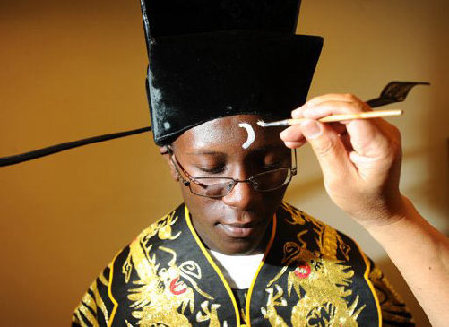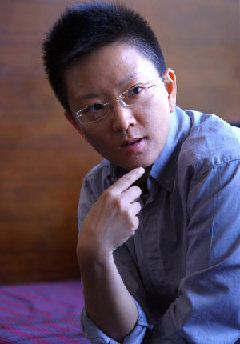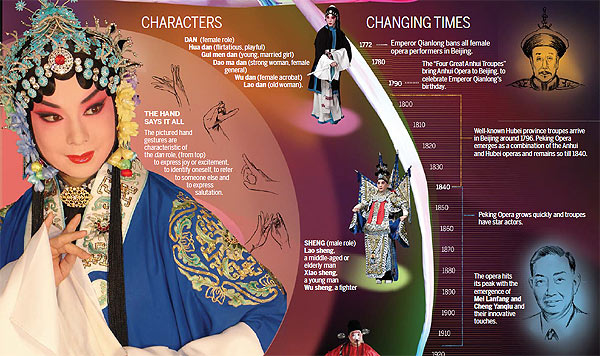Yang Lei's thick eyebrows belie his smooth jaw till the Peking Opera performer reveals he shaves before applying makeup, to make sure there is no stubble. After all, stubble just won't do when the 33-year-old goes on stage dressed in dazzling costumes and sings a soprano aria. Yang is one of the nation's young nan dan (man who plays a female role), a practice forged at a time when women were forbidden to take the stage.
Cross-dressing has been an integral part of Peking Opera from the beginning and remains so today. Zhang Zixuan reports.
|
Tyler Thompson is the face of change for Peking Opera. The African-American who has just turned 16 and lives in Oakland, California, has been interested in the art form since he was at kindergarten and performed the role of the cowherd in Xiao Fang Niu (Little Cowherd) when he was just 8. He demonstrated his Peking Opera skills to former Chinese vice-premier Wu Yi at the US State Department, and has appeared on the TV show Good Morning America and various symphony halls in the US. Full story |
Actress Wang Peiyu has an honorable Peking Opera title - contemporary China's first nu lao sheng - but she is clearly uncomfortable with it. "Don't get me wrong, I deeply appreciate the recognition of audiences," the 33-year-old artist says of the role that has a female playing a middle-aged or elderly man, respected for his sagacity and wisdom. "I just think the title is not appropriate," she says, pointing out that the addition of nu (female) to lao sheng (literally, old man) is an unnecessary emphasis on the gender of the artist. Wang explains that female Peking Opera performers appeared on stage in the late Qing Dynasty (1644-1911). But since performing troupes then did not allow men and women to mix, the all-women troupes had to have the actresses playing the male roles too.
|
|
|
|
Staging a revival While many of the youngsters make plans about where to go out and celebrate, Lan Gongxin waits for her husband, Yang Shaopeng, a 35-year-old singer, who won the Best Lao Sheng Award (Peking Opera's older male role) at the gala. They have to get up early the next morning for another round of rehearsals. |
|
|
Lian Pu "Personality makeup" refers to facial designs for jing and chou roles, with colors representing emotions, such as white for fear, red for shyness, dark for suntan, and sallow for illness. Great importance is paid to the eyes and eyebrows. Facial designs for jing roles have basic forms such as the san kuai wa lian (three-section face) and sui lian (fragmentary face) and are used to represent generals, officials, heroes, gods and ghosts. Chou actors have patches of white in various shapes painted around the eyes and nose. Chou roles have two categories, namely wen chou (civil) and wu chou (martial). Colors again symbolize various personalities: Red: Brave, faithful and wise.
Purple: Wise, brave and steadfast. Black: Upright and outspoken. Blue: Brave, upright, but obstinate and unruly Green: Chivalrous but with a feisty attitude. Yellow: Valiant military men, or crafty civil officers. White: Insidious and treacherous. Gold and silver: Mysterious monsters or gods.
|
While most TV programs focus on the traditional aspects of Peking Opera, a variety show on CCTV-11 emphasizes entertainment. Command in the Theater has been airing since January 2011 and has become the top-rated show on the opera channel. The weekly show, 60 minutes long, features competitions among four guests (mainly young showbiz entertainers) who try to outdo each other in games related to Peking Opera. "Not a single program has ever popularized Peking Opera in the form of playing games that can attract young viewers, our target audience," producer Bu Bing says. |



